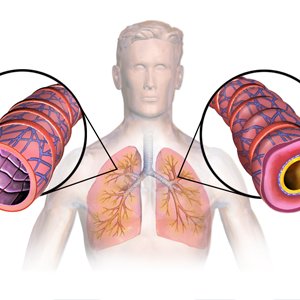Sometimes as a parent we assume, that our child is still recovering from another viral or respiratory infection. But sometimes this may not be the case. If they are complaining about ‘chest hurting’ while playing running games or sports or showing regular signs of fatigue and lack of energy, it could be an indication of Asthma.
Asthma differs from person to person; it may occur in one’s life in later stages or could have been diagnosed at the birthright itself. The severity of this and its disappearance could depend on how severe the case of asthma was. Nobody likes watching their child suffer from such ailments, but as parents, as a caretaker, we could always look out for the symptoms before it gets worse.

Usual Symptoms of Asthma in Children:
Wheezing – the slightest irritation or whistling sounds when your child exhales
Frequent Coughing – a viral cough doesn’t last more than a few weeks, so if this continues you might want to take your child for a checkup soon
- Breathing difficulty – heavy breathing or breathing with more pressure on the abdominal muscle
- Aren’t sleeping well – lack of energy, dizziness, always feeling tired, exhausted, not getting enough sleep
- Chest burns or tightness – A sore, congestion, tight feeling in the chest during normal activities of the day
- Shortness of breath -Trouble breathing that may limit play or exercise
- Delayed recovery – very slow recovery from a respiratory infection or bronchitis after a viral infection
Cause of Asthma in Children?
The causes of Asthma could vary from child to child, and their surroundings can have a huge influence on them. Studies suggest that children are more likely to get asthma if:
- They were born premature, especially if they needed help with their breathing
- They had a low weight at the time of birth
- The mother smoked during pregnancy
- They also have eczema or allergies
- If it runs in the family, a family history of asthma, eczema, hay fever or other allergies
- They are exposed to someone who smokes around them or pollution
- As a baby or toddler, they’ve had repeated attacks of bronchiolitis
Ways To Treat Childhood Asthma:
Careful planning and steering clear of what could trigger asthma is the best way to prevent asthma attacks.
1. Limit exposure to things that trigger it. Allergens, pollen grains, house dust, sawdust, irritants, and pollutants in the air, pet’s dander etc.
2. Don’t permit smoking near your child. Exposure to tobacco smoke during infancy is a huge risk factor for childhood asthma, as well as a common trigger of asthma attacks.
3. All work and no Play makes Jack a dull boy. A healthy and active child is what childhood is all about. As long as your child’s asthma is kept in control, sports and physical activity can condition the lungs to work more efficiently.
4. Visit the doctor when necessary. Take appointments on a regular basis. Don’t ignore the signs. Your child’s asthma may not be under control, such as needing to use a relief inhaler too often or if that inhaler is not suiting him/her. Asthma changes over time. Consulting your child’s doctor can help you make any needed treatment adjustments to keep symptoms under control.
5. Let your child have a healthy lifestyle. Being obese can worsen asthma symptoms, and it puts your child at risk of other health problems as well. A balanced diet and outdoor activity can help him/her stay fit.
6. Keep heartburn under control. Acid reflux or severe heartburn (gastroesophageal reflux disease) may worsen your child’s asthma symptoms. He or she may need over-the-counter or prescription medications to control acid reflux. Do not indulge in extremely cold food items or spicy food. It is best to avoid anything that could accelerate the burning sensation any further.
Your child’s doctor will work with you to create a care plan that helps prevent flare-ups as much as possible but it is still your duty to be very tactful if your child suffers from asthma, be it mild or severe enough to meddle with his/her day to day activities. Your child’s situation may improve if things are handled well.



